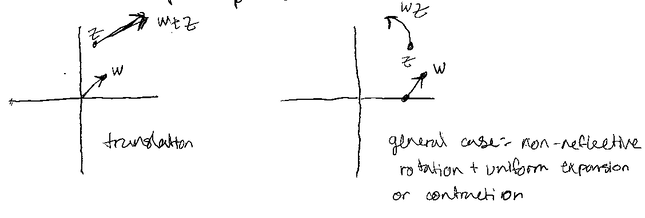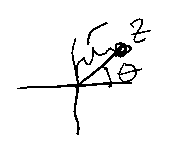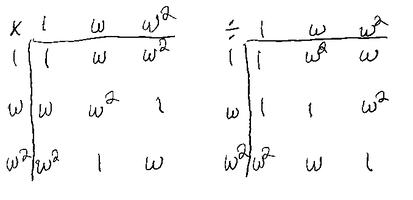Menu
Substance
A summary of Penrose's summary of physics and math.
|
Define addition and multiplication maps for complex numbers:
\[z \mapsto x + z\] \[z \mapsto xz\] with \(z, w \in \mathbb{C}\) On the complex plane: Roots of Unity
For a complex value \(z\), \(e^{z} = 1 + \frac{z}{1!} + \frac{z^{2}}{2!} + \frac{z^{3}}{3!} + ...\) converges for all \(z\). Suppose, \(z, w \in \mathbb{C}\) and \(z = log(w)\) with \(w\) having polar coordinates \([r, \theta]\). Then \(z = log(r) + i\theta\).
Note: above, \(log(w)\) can \( = z\) but also any \(z + 2\pi in\) where \(n = \) any positive, nontrivial number. If \(w\) has polar coordinates \(r, \theta\), note also that \(w = re^{i\theta}\). Note also, \(e^{\pi i} = 1\), \(e^{2\pi i} + 1 = 0\) (the Euler formula). The unit circle in \(\mathbb{C} = \) the circle with \(r = 1\) given by \(w = e^{i\theta}\) for real \(\theta\). \(z^{n} = w \rightarrow z = w^{\frac{1}{n}}\) when \(z = n\) and \(n =\) positive integer, we have \(n\) roots \(w^{\frac{1}{n}}\). Suppose \(w = 1\), \(log(w)\) has solutions \(0, 2\pi i, 4\pi i, 6\pi i, ...\) and we get \(1 = e^{0}, e^{2\pi i/n}, e^{4\pi i/n}, ...\) for positive values of \(1^{\frac{1}{n}}\). We can write \(\epsilon = e^{2\pi i/n}\) st. \(e^{0} = 1, e^{2\pi i/n} = \epsilon, e^{4\pi i/n} = \epsilon^{2}\), etc. These are \(n\) equally spaced points on the unit circle, called roots of unity. For a given \(n\), the \(n^{th}\) roots of unity are a finite multiplicative group (meaning closed under multiplication), the cyclic group denoted \(\mathbb{Z}_{n}\). Example, \(n = 3\) gives \(1, w, w^{2} = 1, e^{2\pi i/3}, e^{4\pi i/3}\) then \(w^{3} = 1\), \(w^{-1} = 2\) and so on:
0 Comments
Leave a Reply. |
Archives
April 2022
Categories |



 RSS Feed
RSS Feed